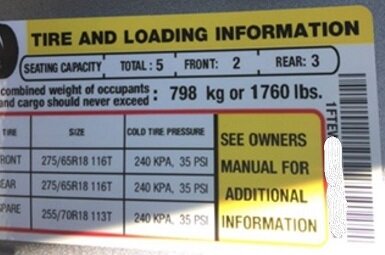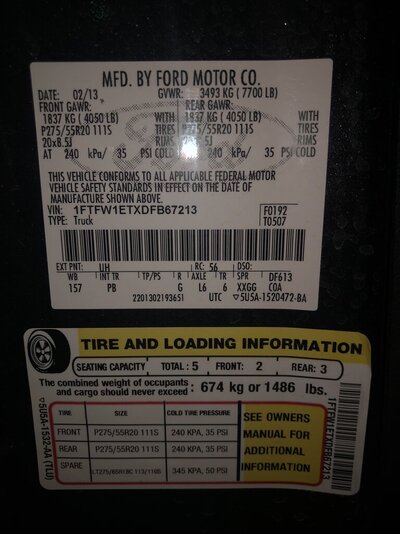307 Tailgater
Well-known member
Current truck 2013 ecoBEAST 3.5L Max Tow Package 3.73 axle 157" WB 4x4
Straight out of 2013 brochure:
Conventional Towing - Maximum Loaded Trailer Weight Ratings (lbs.)
GCWR = 17,100
Maximum Loaded Trailer Weight = 11,100
GVWR Truck = 7,700
Payload = 1840
This where it gets weird
Ford Trailer Towing Selector
F150 Conventional Towing
GCWR = 17,100
Maximum Loaded Trailer Weight = 11,100
Hitch Receiver Weight Capacity
Weight Carrying Max Trailer Capacity = 5,000
Max Tongue Load = 500
Weight-Distributing Max. Trailer Capacity = 11,300
Weight-Distributing Max Tongue Loaded = 1,130
Why did a weight distribution hitch allow for 6,300 (11,300-5,000) extra pounds for max trailer capacity? How does this play a factor with maximum loaded trailer weight(11,100)?
Why did weight distribution hitch allow for extra 630 (1,130-500) pounds for max tongue loaded?
Ford says "trailer tongue load weight should be 10-15% of total loaded trailer weight" Some of you educated me with 20% for fifth wheels which is the average of 15-25%. Should I stay safe and go with 15%? There's a HUUUGE (Donald Trump) difference between 10-15%. Example of what I created on a spreadsheet is 300-500 lbs. difference between 10% and 15% of trailer GVWR for bumper tows that I'm browsing.
Straight out of 2013 brochure:
Conventional Towing - Maximum Loaded Trailer Weight Ratings (lbs.)
GCWR = 17,100
Maximum Loaded Trailer Weight = 11,100
GVWR Truck = 7,700
Payload = 1840
This where it gets weird
Ford Trailer Towing Selector
F150 Conventional Towing
GCWR = 17,100
Maximum Loaded Trailer Weight = 11,100
Hitch Receiver Weight Capacity
Weight Carrying Max Trailer Capacity = 5,000
Max Tongue Load = 500
Weight-Distributing Max. Trailer Capacity = 11,300
Weight-Distributing Max Tongue Loaded = 1,130
Why did a weight distribution hitch allow for 6,300 (11,300-5,000) extra pounds for max trailer capacity? How does this play a factor with maximum loaded trailer weight(11,100)?
Why did weight distribution hitch allow for extra 630 (1,130-500) pounds for max tongue loaded?
Ford says "trailer tongue load weight should be 10-15% of total loaded trailer weight" Some of you educated me with 20% for fifth wheels which is the average of 15-25%. Should I stay safe and go with 15%? There's a HUUUGE (Donald Trump) difference between 10-15%. Example of what I created on a spreadsheet is 300-500 lbs. difference between 10% and 15% of trailer GVWR for bumper tows that I'm browsing.
Last edited:


